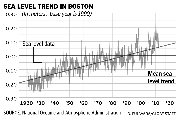Rising sea level a threat to East
Boston could feel especially strong impact, study says
As temperatures are projected to climb, polar ice to melt, and oceans to swell over the coming decades, Boston is likely to bear a disproportionate impact of rising sea levels, government scientists report in a new study.
The seas along the East Coast from North Carolina to New England are rising three to four times faster than the global average, and coastal cities, utilities, beaches, and wetlands are increasingly vulnerable to flooding, especially from storm surges, according to the US Geological Survey study published Sunday.
“Cities in the hot spot, like Norfolk, New York, and Boston, already experience damaging floods during relatively low-intensity storms,” said Asbury Sallenger, a Geological Survey oceanographer and lead author of the study in the journal Nature Climate Change. “Accelerated sea-level rise,” he said, will add to “the height that storm surges and breaking waves reach on the coast.”
The findings come as Boston and Massachusetts officials are taking the first of a range of responses to the threat of rising seas. The report did not project how much levels would rise in the Northeast, but globally, oceans are projected to increase between 2 feet and 6 feet by the end of the century, and as much as an additional 5 feet during the heaviest storms. Climate scientists say such storms are likely to increase in intensity and frequency over the coming decades.
In Boston, officials have begun mapping low-lying areas and critical systems that are most likely to be inundated. The maps show that if sea levels rise just 2.5 feet, it could take little more than a Nor’easter to put much of the Back Bay, East Boston, South Boston, Chelsea, Cambridge, and elsewhere underwater, including much of Logan International Airport and the financial district.
As a result, the Boston Water and Sewer Commission will begin inspecting hundreds of miles of sewers, storm drain connections, pumping stations, and other utility systems this summer to assess what needs to be done to protect them from rising seas. The Boston Redevelopment Authority, as part of its new climate adaptation plan, recently began requiring developers to fill out a questionnaire about their awareness of the potential impact of climate change and whether it is influencing their building plans.
The city, which now requires its departments to consider sea-level rise in planning decisions, has also launched a “green ribbon” commission to build support in the private sector for blunting climate change. The commission will advise the city and large companies on ways to cut greenhouse-gas emissions, increase energy efficiency, and prepare for rising seas.
“There’s an absolute need for developers to be educated and aware of their vulnerabilities and the risks that they’re taking by building in Boston,” said Kairos Shen, the city’s chief planner.Continued...


